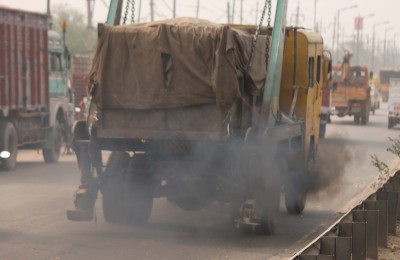 Patna, Feb 15 : The Bihar government has come up with a comprehensive plan to check all forms of pollution in the state.
Patna, Feb 15 : The Bihar government has come up with a comprehensive plan to check all forms of pollution in the state.
S. Chandrashekhar, member secretary Bihar State Pollution Control Board (BSPCB), said that the department is going to install 24 monitoring stations at a cost of Rs 36 crore in different districts of Bihar to analyse air pollution. The officer said these monitoring stations will be installed in the next 2 months. Bihar already has 11 monitoring stations and 6 of them are installed in Patna.
“We signed an MoU with the United Nations Environment Programme (UNEP) on February 12 to ensure a climate resilient and low carbon development pathway in the state. Under this, we will use GOAI technology of remote sensing and artificial intelligence to monitor air pollution. We have asked every industrial unit to use brickless technology,” Chandrashekhar said.
Bihar is a rapidly growing economy and is committed to environmental sustainability by moving towards a climate resilient and low carbon development pathway. With an average of over 10% growth, Bihar has registered higher growth than the Indian economy in the last three years.
At the same time, Bihar is also a state that is highly vulnerable to climate change, which threatens to undermine its developmental efforts. Cities like Patna have a number of real estate construction projects and industrial units currently operational here.
Besides, the number of vehicles increased more than 10-fold in the last 5 years but the roads have not been widened accordingly. As a result, slow movement of vehicles generates higher carbon and sulphur components in gaseous form leading to air pollution. The air quality index of Patna, Muzaffarpur and Gaya remains poor to very poor throughout the year.
“Apart from air pollution, we generally consider solid and liquid wastes responsible for environmental pollution. The principal secretary of environment, forest and climate change has directed all agencies to ensure installation of maximum number of Sewage Treatment Plants in cities and sub towns so that only recycled water would come out and get used for other purposes like in horticulture, cleaning of vehicles and construction. We are making all possible efforts to ensure that recycled water does not go into the rivers or natural water bodies,” Chandrashekhar said.
The officer said that states have a key role to play in identifying and addressing local adaptation and mitigation measures and the local impact of climate change. Bihar has taken this forward by adopting a pathway towards sustainable development.
–IANS
ajk/bg

